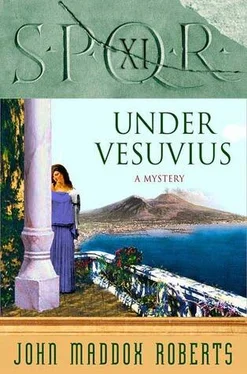John Roberts - Under Vesuvius
Здесь есть возможность читать онлайн «John Roberts - Under Vesuvius» весь текст электронной книги совершенно бесплатно (целиком полную версию без сокращений). В некоторых случаях можно слушать аудио, скачать через торрент в формате fb2 и присутствует краткое содержание. Жанр: Исторический детектив, на английском языке. Описание произведения, (предисловие) а так же отзывы посетителей доступны на портале библиотеки ЛибКат.
- Название:Under Vesuvius
- Автор:
- Жанр:
- Год:неизвестен
- ISBN:нет данных
- Рейтинг книги:3 / 5. Голосов: 1
-
Избранное:Добавить в избранное
- Отзывы:
-
Ваша оценка:
- 60
- 1
- 2
- 3
- 4
- 5
Under Vesuvius: краткое содержание, описание и аннотация
Предлагаем к чтению аннотацию, описание, краткое содержание или предисловие (зависит от того, что написал сам автор книги «Under Vesuvius»). Если вы не нашли необходимую информацию о книге — напишите в комментариях, мы постараемся отыскать её.
Under Vesuvius — читать онлайн бесплатно полную книгу (весь текст) целиком
Ниже представлен текст книги, разбитый по страницам. Система сохранения места последней прочитанной страницы, позволяет с удобством читать онлайн бесплатно книгу «Under Vesuvius», без необходимости каждый раз заново искать на чём Вы остановились. Поставьте закладку, и сможете в любой момент перейти на страницу, на которой закончили чтение.
Интервал:
Закладка:
In traditional fashion they first brought out eggs prepared in every imaginable fashion, some of them from birds I had never heard of. This being a coastal town-and the banquet held on the water to boot-it was fitting the most abundant and imaginative part of the feast were the fish courses. There were great varieties of shellfish along with the finned variety and great concoctions of lampreys, eels, octopi, squid, dolphin, and even skewered whale flesh. All this was accompanied by splendid wines, and soon the occasion was most convivial.
The talk was light and frivolous, which was not unusual. After all, this was not a pack of dry old philosophers debating the merits of Pythagoras's harmonic theories. But there seemed something strange about all the talk, and eventually I realized what it was.
"Julia," I said in a low voice, "do you realize that nobody has mentioned Julius Caesar once? Or Pompey or the eternal struggle between the populares and the optimates!"
"Odd, isn't it?" she said. "These people aren't interested in senatorial politics. They gauge status by wealth, not breeding. They compete through display and by outentertaining their peers, not by currying favor with the masses."
"I find it a great relief. In Rome, I always find myself sprawled next to some old patrician who thinks he's my better because his ancestors settled in Rome fifty years before mine, around a thousand years ago."
"Well," Julia said, "in Rome you certainly wouldn't see their sort at the same table as the city's elite." She nodded toward the end of our table, where Gaeto and his flame-haired wife reclined between a shipping contractor and a priest of Mars, with their wives, and all of them getting along as convivially as any born peers.
"You're letting your patrician snobbery show, my dear," I chided her.
"But the man's a slaver!" she protested.
"Your uncle Julius just made slaves of a whole nation."
"Conquest is honorable," she pointed out, "and degradation is the price of defying Rome. It's not the same as making a living buying and selling human beings."
That was it, of course: the buying and selling part. Just slaughtering a pack of barbarians and selling off the survivors was not the same thing at all. Patricians weren't supposed to engage in trade. I wondered what she would think had she been present to see Uncle Julius auctioning off thousands of prisoners at a time, wheedling up the price with the touch of an expert. The slavers used to follow the legions like vultures, and Caesar knew exactly what he could get from them. I suppose Julia thought it was all right for him to sell them, since he hadn't exactly bought them.
The servers brought out a specialty of the region: a fish stew containing a great variety of shellfish in a savory broth tinged with aromatic saffron. This is one of my favorite dishes, and I forgot all about slavers and Caesar while I dug into the scallops and oysters, cracked crab claws, and, at intervals, dipped bread into the broth.
"I see we've found your weakness," said a woman named Quadrilla. She was the wife of the duumvir Manius Silva. She was a small, dark woman and her Coan-cloth gown rested on her like a shadow. On her head she wore a silver diadem set with black pearls. Her vulpine little face was engagingly acerbic.
"Keep me supplied with this," I told her, "and you'll have nothing but favorable judgments from me. This must be what the gods eat on their better days."
"My husband exaggerates," Julia assured her. "Much as he loves good food, he is boringly conventional in his public duties. I wish I could say the same for his off-duty activities."
While these women discussed my shortcomings, I let my gaze roam over the crowd. Everyone seemed extraordinarily happy, except those who were too inebriated to feel much of anything. In true Baiean fashion, there were specially trained slaves to carry these off to their litters before anything unpleasant happened. I saw my freedman, Hermes, arm wrestling with a man who, from his short, two-striped tunic and small topknot, I took to be a charioteer, the two of them surrounded by attractive young women. Hermes was strong, but men who have spent years holding and controlling the reins of a quadriga have hands and arms like iron. Hermes lost the contest and his wager, but he seemed to care little for his defeat. He smiled blissfully as the girl next to him, her hair dyed a startling purple, massaged his sore arm.
A short distance from us, Circe and Antonia had planted themselves at either side of young Gelon. The lad seemed quite accustomed to such feminine attention and was regaling them with something that made them rock with immoderate laughter. I looked all over but did not see Gorgo, the priest's daughter. The priest himself was at our table, but was not looking as merry as the rest, perhaps because he was sharing the table with Gaeto.
By late evening the party began to break up. It might have gone on all night, but a stiff breeze sprang up off the sea and the boatmen advised that the great raft be taken apart and towed ashore. Before leaving, I got up and addressed the community.
"People of Baiae, at last I have found the one place in Italy where people truly know how to live!" This brought vigorous applause and shouts of agreement. "Now that I've seen Baiae, I may not even bother going to Pompeii and Puteoli. What would be the point?" At this, the crowd roared with approval. "In fact, I may just settle here permanently!" Raucous clapping and pledge making ensued.
On that note, the wind redoubled and everyone hastened to get ashore. Our litter was brought over the boat bridge from shore, and we crawled in. I was replete with the all the delicacies I had taken aboard and my head was only lightly buzzing from the wine. The bridge rocked with the growing waves, but our lurching steadied as the bearers took us ashore.
"I am going to have to get one of those Coan-cloth gowns," Circe said.
"I already have one," Antonia informed her. "I'd have worn it tonight if I'd known it was the fashion."
"Not in my party, you wouldn't," Julia said. "The dignity of the praetor has to be upheld, and it wouldn't look good if the women in his entourage dress like trans-Tiber prostitutes." She affected to ignore their laughter. "I suppose there's something to be said for transparent gowns. How else would we know that Rutilia, the wife of Norbanus, gilds her nipples or that Quadrilla, the wife of Silva, has a navel stretched three times its natural size to accommodate that huge sapphire?"
"How did she do that? I wonder," Circe mused.
"Started with a small, navel-sized sapphire," Antonia said, "and replaced it with a larger one and then a larger, until she could accommodate that stone."
"The concubine of the marble merchant has Scythian tattoos all over her thighs and buttocks," Circe remarked.
"They were Thracian, not Scythian," I told her. "I've seen those designs before."
"I can see where your attention was all evening," Julia said. Then she grew thoughtful. "They are a strange lot of people. With all that wealth and dazzle I expected them to behave like rich, jumped-up Roman freedmen, all vulgarity to go along with their ostentation. But they are as suave and cultured as any of the better class of Romans, considering how many of them are tradesmen."
"A little light on the gravitas, though," Antonia said. "And that suits me just as well. I'll take frivolity over heavy political talk any day. Or night."
I was wondering about Gaeto's words to me. He'd said that I might find the banquet "illuminating." Had he meant this social leveling? Certainly, I would never have expected to see a slaver at the table of honor at a banquet in Rome. Or anywhere else.
3
The next few days, I traveled among the towns of the district, holding court, being feted and entertained, and generally enjoying life.
Читать дальшеИнтервал:
Закладка:
Похожие книги на «Under Vesuvius»
Представляем Вашему вниманию похожие книги на «Under Vesuvius» списком для выбора. Мы отобрали схожую по названию и смыслу литературу в надежде предоставить читателям больше вариантов отыскать новые, интересные, ещё непрочитанные произведения.
Обсуждение, отзывы о книге «Under Vesuvius» и просто собственные мнения читателей. Оставьте ваши комментарии, напишите, что Вы думаете о произведении, его смысле или главных героях. Укажите что конкретно понравилось, а что нет, и почему Вы так считаете.









